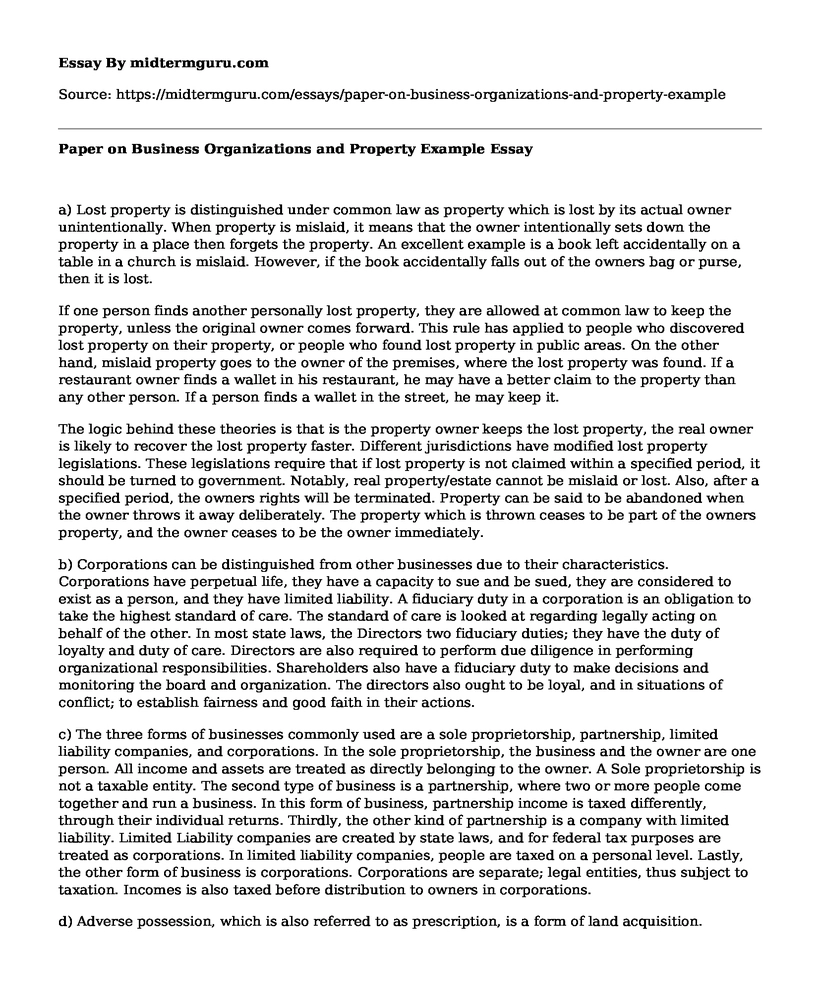a) Lost property is distinguished under common law as property which is lost by its actual owner unintentionally. When property is mislaid, it means that the owner intentionally sets down the property in a place then forgets the property. An excellent example is a book left accidentally on a table in a church is mislaid. However, if the book accidentally falls out of the owners bag or purse, then it is lost.
If one person finds another personally lost property, they are allowed at common law to keep the property, unless the original owner comes forward. This rule has applied to people who discovered lost property on their property, or people who found lost property in public areas. On the other hand, mislaid property goes to the owner of the premises, where the lost property was found. If a restaurant owner finds a wallet in his restaurant, he may have a better claim to the property than any other person. If a person finds a wallet in the street, he may keep it.
The logic behind these theories is that is the property owner keeps the lost property, the real owner is likely to recover the lost property faster. Different jurisdictions have modified lost property legislations. These legislations require that if lost property is not claimed within a specified period, it should be turned to government. Notably, real property/estate cannot be mislaid or lost. Also, after a specified period, the owners rights will be terminated. Property can be said to be abandoned when the owner throws it away deliberately. The property which is thrown ceases to be part of the owners property, and the owner ceases to be the owner immediately.
b) Corporations can be distinguished from other businesses due to their characteristics. Corporations have perpetual life, they have a capacity to sue and be sued, they are considered to exist as a person, and they have limited liability. A fiduciary duty in a corporation is an obligation to take the highest standard of care. The standard of care is looked at regarding legally acting on behalf of the other. In most state laws, the Directors two fiduciary duties; they have the duty of loyalty and duty of care. Directors are also required to perform due diligence in performing organizational responsibilities. Shareholders also have a fiduciary duty to make decisions and monitoring the board and organization. The directors also ought to be loyal, and in situations of conflict; to establish fairness and good faith in their actions.
c) The three forms of businesses commonly used are a sole proprietorship, partnership, limited liability companies, and corporations. In the sole proprietorship, the business and the owner are one person. All income and assets are treated as directly belonging to the owner. A Sole proprietorship is not a taxable entity. The second type of business is a partnership, where two or more people come together and run a business. In this form of business, partnership income is taxed differently, through their individual returns. Thirdly, the other kind of partnership is a company with limited liability. Limited Liability companies are created by state laws, and for federal tax purposes are treated as corporations. In limited liability companies, people are taxed on a personal level. Lastly, the other form of business is corporations. Corporations are separate; legal entities, thus subject to taxation. Incomes is also taxed before distribution to owners in corporations.
d) Adverse possession, which is also referred to as prescription, is a form of land acquisition. Adverse possession creates ownership through the continuous acquisition of real property with the exclusion of the owner. This method provides with the one acquiring land a legal title to the property after a period of time prescribed by the law. Acquisition by prescription occurs due to the lapse of time provided by the statute of limitations.
e) Types of deeds include warranty Deeds; which act as a guarantee of the right to sell the property. Special warranty Deed covers guarantees against problems and claims. Also, there is quick claim method, which mainly allows transfer of property rights from one property to the next. On agreeing on the price, a Grant Deed exists to transfer interest to the buyer from the seller. A Quitclaim is the worst type of Deed because it does not guarantee a persons interests.
Cite this page
Paper on Business Organizations and Property Example. (2021, May 31). Retrieved from https://midtermguru.com/essays/paper-on-business-organizations-and-property-example
If you are the original author of this essay and no longer wish to have it published on the midtermguru.com website, please click below to request its removal:
- Essay on Industry and Competitor Analysis as a Market Valuation Tool
- Discussion Questions on Business Administration - Paper Example
- Heuristic Evaluation: Assessing Usability for Improved Interaction & Acceptance - Essay Sample
- Automation in Hospitality & Tourism: How Technology is Transforming the Industry - Essay Sample
- Essay Sample on Working and Career Theories
- Acknowledging Contributions - Essay Sample
- TeleClinic: A Leader in Telemedicine & Teleradiology Services - Essay Sample







